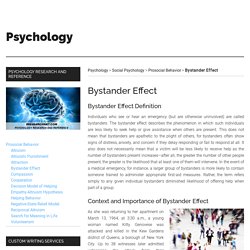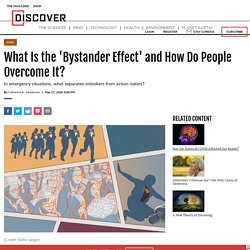

Bystander Effect. Bystander Effect. Bystander Effect Definition Individuals who see or hear an emergency (but are otherwise uninvolved) are called bystanders.

The bystander effect describes the phenomenon in which such individuals are less likely to seek help or give assistance when others are present. This does not mean that bystanders are apathetic to the plight of others, for bystanders often show signs of distress, anxiety, and concern if they delay responding or fail to respond at all. It also does not necessarily mean that a victim will be less likely to receive help as the number of bystanders present increases—after all, the greater the number of other people present, the greater is the likelihood that at least one of them will intervene.
In the event of a medical emergency, for instance, a larger group of bystanders is more likely to contain someone trained to administer appropriate first-aid measures. Bystander Effect. What Is the 'Bystander Effect' and How Do People Overcome It? This story appeared in the June 2020 issue as "Action!

" Subscribe to Discover magazine for more stories like this. On April 9, 2017, three security officers from the Chicago Department of Aviation forcibly removed David Dao from an overbooked United Airlines flight. Dao, a 69-year-old doctor, was dragged down the plane’s aisle after he refused to give up his seat. In the process, his head hit an armrest and he was knocked unconscious. The passengers clearly recognized what was occurring: Many took out their phones and filmed the scene and later expressed their outrage loudly on social media.
At some level, this is hardly surprising. However, this is not a hard-and-fast rule; sometimes people in groups are able to break out of the bystander role. Psychologists call those who display moral courage and choose to do something rather than watch in silence moral rebels. Specialized Skills If you act, will it matter? (Credit: Kellie Jaeger) Now. Powered by Northrop Grumman. If you see someone in distress, will you help them?

We all like to consider ourselves to be good people, but when we’re caught in the moment, we freeze. What is the bystander effect? For more than 50 years, psychologists have observed this phenomenon again and again in experiments and in real life. The research overwhelmingly shows the more people that are present when there’s an emergency, the less likely they are to help. What Is the Bystander Effect? Scientific studies have shown that in one-on-one situations, people will help each other out. Research suggests that this seemingly cruel behavior is part of human nature. When bystanders observed someone who was hurt or in danger, it activated their premotor cortex, which should have prepared them to help.
The Bystander Effect. Group Inhibition of Bystander Intervention in Emergencies. The Bystander Effect and Social Control Behavior: The Effect of the Presence of Others on People's Reactions to Norm Violations. Masculinity Inhibits Helping in Emergencies: Personality Does Predict the Bystander Effect. Fear of Negative Evaluation Affects Helping Behavior: The Bystander Effect Revisited. The Positive Bystander Effect: Passive Bystanders Increase Helping in Situations With High Expected Negative Consequences for the Helper. The Roots of Stress-death and Juvenile Delinquency in Japan: Disciplinary Ambivalence and Perceived Locus of Control. The Five-Step Decision Model of Helping (Darley & Latané, 1970) Crowded Minds: The Implicit Bystander Effect.
Bystander Intervention in Emergencies: Diffusion of Responsibility. We Are All Bystanders. For more than 40 years, Peggy Kirihara has felt guilty about Stewart.

Peggy liked Stewart. They went to high school together. Their fathers were friends, both farmers in California’s Central Valley, and Peggy would always say “hi” when she passed Stewart in the hall. Yet every day when Stewart boarded their school bus, a couple of boys would tease him mercilessly. And every day, Peggy would just sit in her seat, silent. “I was dying inside for him,” she said. Peggy still can’t explain why she didn’t stick up for Stewart. . © Damian King But perhaps most surprising—and distressing—to Peggy is that she considers herself an assertive and moral person, yet those convictions aren’t backed up by her conduct on the bus.
“I think I would say something now, but I don’t know for sure,” she said. Many of us share Peggy’s concern. Why don’t we help in these situations? “Why,” asked Garfield, “do some people respond to these crises while others don’t?” Altruistic inertia Who are these people? © Damian King. Overcoming the Bystander Effect. Be Aware to Care: Public Self-Awareness Leads to a Reversal of the Bystander Effect. The Bystander Effect: Why Some People Act and Others Don't. How to Be Kinder to Strangers in Singapore. The Charities Aid Foundation recently released the World Giving Index 2017, which provides insight into the scope and nature of giving around the world. Based on data collected from the Gallup World Poll, the index, which polled 1,000 individuals in each representative country, revealed two surprising facts.
Myanmar, Indonesia and Kenya turned out to be among the most charitable countries, even though they have a huge number of their populations living below the poverty line. Being poor does not stop one from being generous. Wealthy countries such as the United States, Canada, New Zealand, Australia and the United Arab Emirates also feature in the top 10. Myanmar, the top country for four years in a row, has a poor human rights record, in part because of its treatment of the Rohingya Muslims. Singapore, ranked 30, is behind Indonesia (2), Myanmar (1) and Thailand (15), but streets ahead of Cambodia (134), Vietnam (116) and the Philippines (54) in Asean. Changing our mindset.